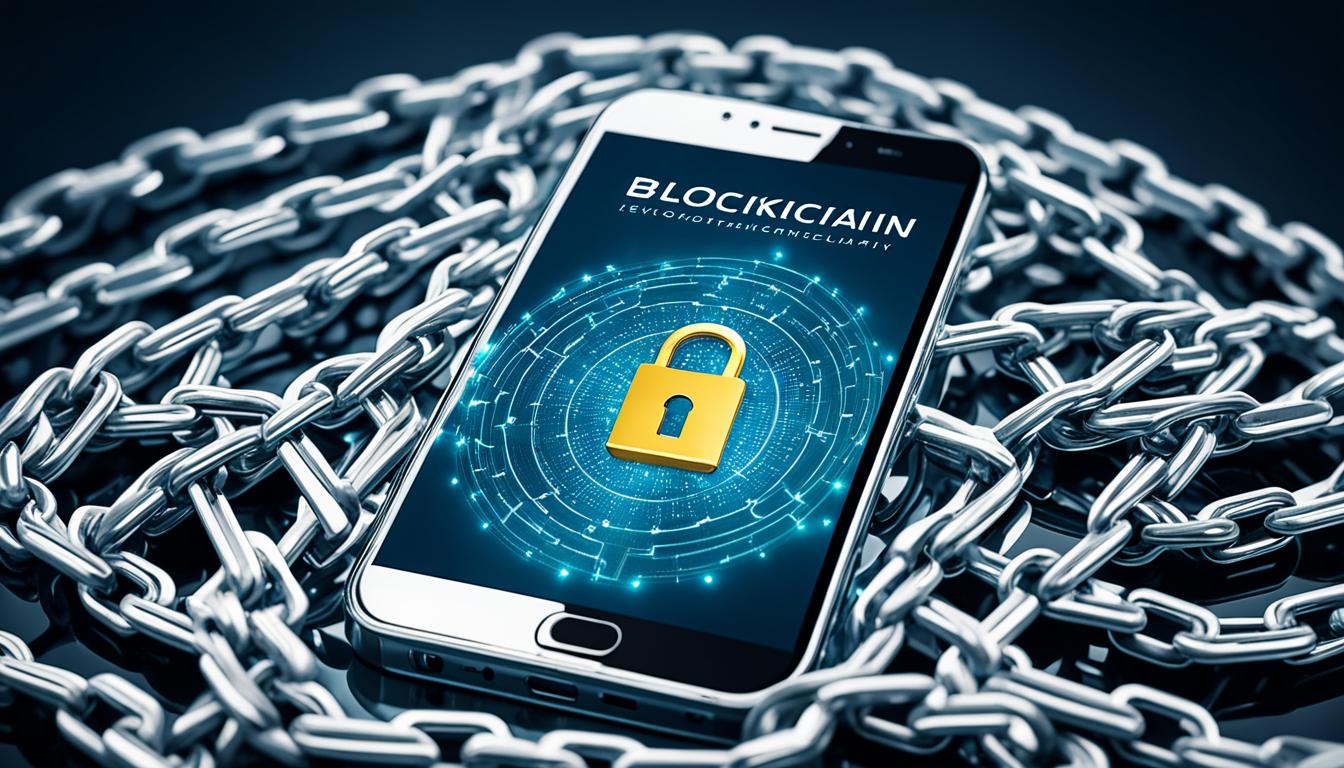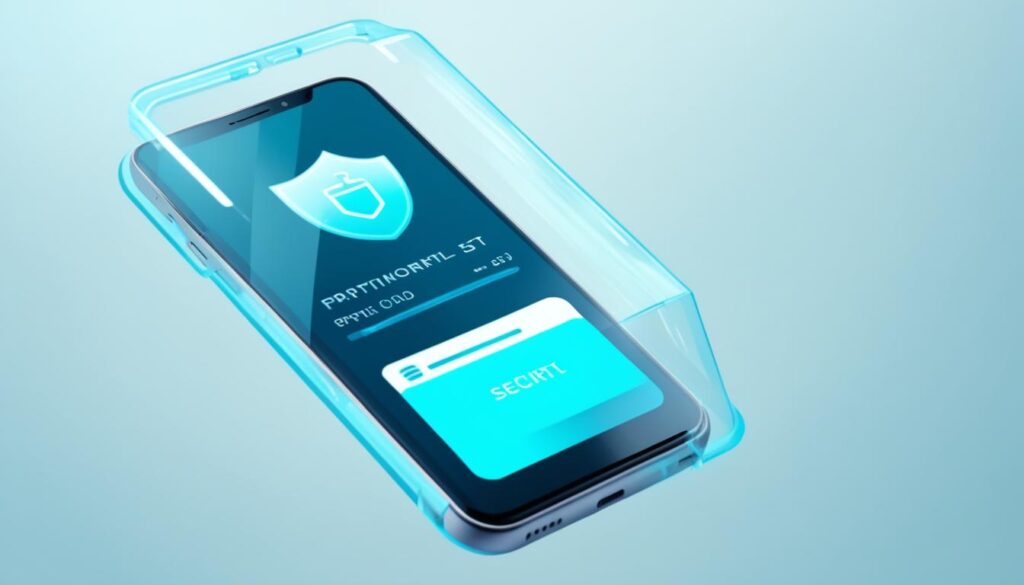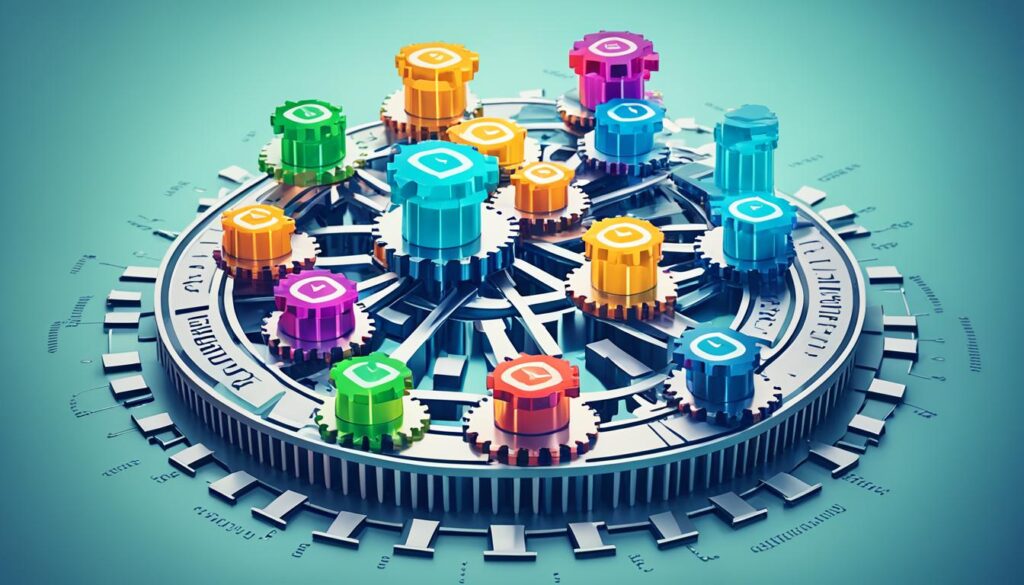Mobile apps are now a big part of our daily lives. They help us with many transactions and services. But, as we use them more, keeping our data safe has become very important. This is where blockchain technology comes in as a strong solution to make mobile app transactions secure.
Blockchain is the tech behind things like Bitcoin. It’s a way to manage data securely and transparently. It uses decentralization, immutability, and cryptography to make data safe. This makes blockchain a new way to secure mobile app transactions.
Table of Contents
Key Takeaways
- Blockchain technology can enhance the security of mobile app transactions by leveraging decentralization, immutability, and cryptography.
- Mobile apps that integrate blockchain can improve data privacy, prevent fraud, and increase trust in digital payments.
- Blockchain-based mobile apps can facilitate secure peer-to-peer transactions, digital identity management, and transparent supply chain tracking.
- Implementing blockchain in mobile apps requires addressing scalability issues and regulatory compliance, but the potential benefits outweigh the challenges.
- Blockchain-powered mobile apps are poised to transform industries such as finance, healthcare, and logistics, providing a new era of secure and transparent digital experiences.
Understanding Blockchain Technology
Blockchain technology is changing how we handle digital data. It’s a decentralized, distributed ledger that records transactions across many computers. This means it doesn’t rely on a single point of control like traditional systems do.
What is Blockchain?
Think of blockchain as a chain of blocks, each holding many transactions. When a new transaction happens, it gets added to every computer’s ledger. This way, the data is safe and open, not controlled by one person or group.
How Does Blockchain Work?
Blockchain uses decentralization, encryption, and transparent transactions to work. When a transaction starts, it goes out to a network of nodes for checking. If it’s okay, it gets added to a block. This block then links to the others, making a secure record of the transaction.
| Blockchain Characteristics | Description |
|---|---|
| Decentralization | Blockchain runs on a network of peers, cutting out the need for a central authority. |
| Cryptography | It uses strong encryption to keep data safe and ensure transaction integrity. |
| Transparency | Everyone on the blockchain can see and check the history of transactions. |
| Immutability | Once a transaction is on the blockchain, it can’t be changed or erased, keeping records safe and reliable. |
These features make blockchain great for secure and transparent data management. It’s used in many areas, like finance, supply chain, healthcare, and more.
The Need for Secure Mobile App Transactions
Mobile payments are now a big part of our lives, making it easy to handle money on the move. But, this ease comes with a big responsibility. We need strong data security and fraud prevention to keep our financial info safe. Old ways of paying with mobile often leave our data open to hackers, putting our money at risk.
The rise of mobile payments has changed how we buy things, but it also brings new problems. We need to make sure people trust these payments and follow the rules. With more people using apps for money matters, the chance of fraud and data leaks has gone up. This shows we really need a safer way to pay.
“The future of mobile payments lies in a secure, transparent, and decentralized platform that can protect user data and prevent fraudulent activities.”
Fixing these issues is key for mobile payments to keep growing and being trusted. By using strong security and following regulatory compliance, app makers can build trust with users. This makes mobile payments safer and more dependable for everyone.
Next, we’ll look at how blockchain technology can make mobile app transactions safer. We’ll see its benefits and what to think about when adding it to apps.
Blockchain’s Role in Mobile App Security
As digital tech grows, keeping mobile app transactions safe is crucial for users and developers. Blockchain tech is a big help in this area.
Decentralization and Data Integrity
Blockchain is different from old systems because it’s decentralized. Data spreads out over many nodes on a network. This makes data integrity of mobile app transactions better. It’s harder for hackers to mess with the data because it’s spread out.
Immutability and Transparency
Blockchain is known for being immutable. Once a transaction is on the ledger, it can’t be changed or erased. This means transparency in mobile app transactions is high. Everyone can check the data’s integrity and see where digital assets go. This is key when trust and accountability matter a lot.
| Blockchain Benefit | Impact on Mobile App Security |
|---|---|
| Decentralized Architecture | Boosts data integrity by spreading info across a network, making it harder to hack. |
| Immutable Records | Makes transactions transparent, as data can’t be changed or erased. |
| Transaction Transparency | Let’s everyone check the data’s integrity and track digital assets safely. |
Using blockchain’s decentralized architecture, immutable records, and transaction transparency, mobile app makers can boost their apps’ security. This gives users a safe place for their digital dealings.
Using Blockchain for Secure Mobile App Transactions
In the world of mobile apps, blockchain technology is changing the game for secure transactions. It brings trust and transparency to mobile payments. This lets users make transactions with confidence.
Smart contracts and digital signatures are at the core of this secure system. Smart contracts use blockchain to follow set rules automatically. This means transactions are fast and don’t need a middleman. It also cuts down the risk of one point failing, making the system more secure.
Digital signatures add another layer of security. They check who is making a transaction. With cryptography, these signatures make sure transactions can’t be changed and trace back to the owner. This builds trust and transparency in the app world.
By using these blockchain innovations, app developers can give users a smooth and safe way to make transactions. This includes blockchain-based mobile payments, transaction processing, and digital signatures. As more people use this tech, mobile app security is looking up.
“Blockchain technology has the potential to revolutionize the way we think about mobile app transactions, bringing unprecedented levels of security and trust to the entire ecosystem.” – Industry Expert
Key Benefits of Blockchain for Mobile Apps
More people are using mobile apps, making secure and reliable transactions a big need. Blockchain technology brings many benefits to make mobile app transactions safer and more efficient.
Enhanced Data Privacy
Using blockchain for mobile app transactions means better data privacy. Its decentralized nature and strong security keep user data safe from unauthorized access. This lets users control their personal info and trust the app more.
Fraud Prevention
Blockchain also helps prevent fraud in mobile apps. Its secure and traceable transactions make it hard for bad actors to fake or alter financial records. This makes it easier for app developers and users to spot and stop fraud, making apps more secure and trustworthy.
| Benefit | Description |
|---|---|
| Enhanced Data Privacy | Blockchain’s decentralized architecture and cryptographic security enable secure identity management, protecting user data from unauthorized access or misuse. |
| Fraud Prevention | The immutable and traceable nature of blockchain-based transactions helps detect and prevent fraudulent activities, improving the overall security and trustworthiness of mobile apps. |
By using blockchain technology, mobile app developers can make apps that are more secure, open, and trusted. These apps meet the need for data privacy, fraud reduction, and regulatory compliance.
Challenges in Implementing Blockchain for Mobile Apps
Blockchain technology brings great benefits for keeping mobile apps safe. But, it’s not easy to use. Developers and businesses face big challenges like scalability issues and regulatory compliance.
Scalability Issues
One big problem with blockchain scalability for mobile apps is how slow they work. They can’t handle as many transactions as regular payment systems. For example, Bitcoin and Ethereum can only do a few dozen transactions per second.
This means users might face delays and get frustrated. It could also stop more people from using blockchain-based apps.
Regulatory Compliance
Another big challenge is following regulatory frameworks and data privacy laws. These rules change a lot from place to place. Mobile app developers must make sure their apps follow all the laws.
If they don’t, they could face big fines, legal trouble, and a bad reputation. This makes it harder for blockchain-based mobile apps to get popular.
To make blockchain-based mobile apps more popular, we need to solve these problems. Developers and businesses should work with regulators, find new ways to scale, and focus on making users happy. This will help unlock the full potential of blockchain in mobile apps.
Popular Blockchain Platforms for Mobile Apps
The need for secure and decentralized mobile apps is growing fast. Blockchain technology has changed to meet this need. Many blockchain platforms are now top choices for making mobile apps. Each one has special features and abilities. Let’s look at some top blockchain platforms changing mobile app development.
Ethereum
Ethereum is a big name in blockchain tech. It lets people make decentralized applications (dApps). It’s great for apps about cryptocurrency and finance because it’s secure and clear.
Hyperledger Fabric
Hyperledger Fabric is made for big companies. It’s a blockchain platform for decentralized applications with a special design. It’s perfect for things like supply chain, logistics, and healthcare, where keeping data safe is key.
Corda
Corda is from the R3 consortium and is all about finance and regulated areas. It focuses on keeping things private, working well with others, and following the rules. This makes it a top pick for financial apps.
Stellar
Stellar is all about making payments and cryptocurrency moves across borders. It’s quick and cheap, making it great for apps about payments and sending money abroad.
| Blockchain Platform | Key Features | Ideal Use Cases |
|---|---|---|
| Ethereum | Smart contracts, Decentralized applications | Cryptocurrency, Finance, Decentralized apps |
| Hyperledger Fabric | Modular architecture, Enterprise-grade | Supply chain, Logistics, Healthcare |
| Corda | Privacy, Interoperability, Compliance | Financial services, Regulated industries |
| Stellar | Fast transactions, Low fees | Cross-border payments, Remittance |
These are just a few blockchain platforms changing mobile app making. As things keep moving forward, developers and companies will have more choices. They can pick from many to make secure, decentralized, and new mobile apps.
Real-World Use Cases of Blockchain in Mobile Apps
Blockchain technology is growing fast and is being used in many areas, including making mobile apps. It’s being used in two main ways: in cryptocurrency wallets and for managing supply chains.
Cryptocurrency Wallets
More and more people are using blockchain-powered cryptocurrency wallets on their phones. These wallets use blockchain’s secure and open nature to keep digital assets safe and clear. They protect users’ privacy and fight fraud, making them a top choice for handling cryptocurrency on the move.
Supply Chain Management
Blockchain in mobile apps is also changing how we manage supply chains. These apps give a clear view of the supply chain’s every step. They track goods, check asset tracking, and make sure products are real, all in a secure way. This helps businesses work better, save money, and build trust with customers.
Blockchain technology is opening up many new ways to use in making mobile apps. It brings more security, openness, and trust to our daily digital life.
Integrating Blockchain into Existing Mobile Apps
Many businesses are now looking to update their mobile apps with blockchain technology. This move brings many benefits, like better security and data safety. It also helps with working together better and stopping fraud.
Adding blockchain to old mobile systems needs a good plan. This means updating the app’s core, making sure it works well with blockchain, and using API integration to add blockchain features.
- Look at the app’s current setup to see where blockchain can add the most value.
- Make a migration plan to slowly move the app to a blockchain-based setup.
- Use secure API integration to link the app with blockchain networks for data and transaction exchange.
- Make sure the app and blockchain platform work well together for smooth data exchange.
- Make the app easy to use for blockchain features.
With blockchain integration, businesses can open up new chances for their apps. This includes secure digital payments and clear supply chain management.
| Feature | Benefit |
|---|---|
| Decentralized Data Storage | Better data safety and security |
| Transparent Transactions | More trust and accountability |
| Interoperable API Integrations | Easy integration with other systems |
As blockchain tech grows, adding it to mobile apps is a smart move. It helps keep your digital services ahead in the market.
“Blockchain integration is not just about modernizing mobile apps; it’s about creating a more secure, transparent, and interconnected digital ecosystem.”
Best Practices for Developing Blockchain-Based Mobile Apps
Blockchain technology is becoming more popular in making mobile apps. It’s important to follow best practices for secure, scalable, and user-friendly apps. Focus on secure coding practices and user experience considerations.
Secure Coding Practices
Creating blockchain-based mobile apps needs a big focus on secure coding. Developers should always think about security and data integrity from start to finish. This means:
- Using strong access controls and ways to check who gets in
- Using secure coding to stop common problems like SQL injection and cross-site scripting (XSS)
- Keeping user data safe when it’s stored and sent
- Checking the code often and fixing any security issues found
User Experience Considerations
Blockchain technology brings more security and transparency, but it can make things harder for users. Developers need to make sure the app is easy to use. Important things to think about include:
- Making it easy for new users to get started
- Having clear and easy-to-use transaction management and wallet management parts
- Keeping the app fast and able to handle lots of users
- Listening to what users say and making the app better
By following these best practices, developers can make blockchain-based mobile apps that are secure, work well, and easy for users. This lets them use this new technology to its fullest.
| Best Practices | Description |
|---|---|
| Secure Coding | Implement robust access controls, prevent common vulnerabilities, and ensure secure data storage and transmission. |
| User Experience | Simplify onboarding, provide intuitive interfaces, optimize performance and scalability, and continuously gather user feedback. |
The Future of Blockchain in Mobile App Development
Blockchain technology is growing fast, and it will change the mobile app world a lot. Blockchain trends show it will be key for making apps more secure and innovative.
One big area is combining blockchain with the Internet of Things (IoT). This mix lets mobile apps handle IoT data safely. It opens up new uses in things like decentralized finance and smart homes.
The growth of mobile app innovation will also come from using blockchain. Developers can make apps that work well with decentralized systems. This means users get safe, clear transactions, better privacy, and less risk.
As new tech comes out, the link between blockchain and mobile apps will get stronger. We’ll see new things like peer-to-peer markets, digital identities, and tracing supply chains. These will change how we use our phones.
In short, blockchain in mobile app development looks bright. It could change how we think about security, trust, and innovation. As we keep exploring blockchain, we’ll see apps that do amazing new things.
“The integration of blockchain and mobile app development will pave the way for a new era of secure, transparent, and decentralized mobile experiences.”
Resources for Learning Blockchain and Mobile App Development
Exploring blockchain technology and mobile app development is exciting. It doesn’t matter if you’re an expert or just starting. There are many resources to help you learn and grow. This section will show you some top tools for your learning journey.
Unlock Your Potential with Online Courses
Platforms like Udemy, Coursera, and edX offer a wide range of blockchain learning resources and mobile app development tutorials. Experts in the field teach these courses. They cover everything from blockchain basics to making secure, innovative apps.
Stay Informed with Industry Publications
It’s important to keep up with the latest in blockchain and mobile app development. Industry publications like CoinDesk, Blockchain Magazine, and Mobile Dev Memo have articles, case studies, and insights. They help you stay ahead.
Connect with Developer Communities
Being part of developer communities is great for learning and networking. Sites like GitHub, Reddit’s r/blockchain and r/mobiledev, and forums offer discussions, code sharing, and projects. You can learn from peers and experts.
| Resource Type | Examples | Key Benefits |
|---|---|---|
| Online Courses | Udemy, Coursera, edX | Comprehensive blockchain learning resources and mobile app development tutorials, taught by industry experts |
| Industry Publications | CoinDesk, Blockchain Magazine, Mobile Dev Memo | Stay up-to-date with the latest trends, case studies, and thought leadership in the industry |
| Developer Communities | GitHub, Reddit’s r/blockchain and r/mobiledev | Engage in discussions, share code, and collaborate with experienced developers |
Using these blockchain learning resources, mobile app development tutorials, online courses, industry publications, and developer communities can help you. You’ll build a strong base in blockchain and mobile app development. This will let you create innovative solutions for the digital world.
Conclusion
Blockchain technology is changing how we make secure digital payments through mobile apps. It uses decentralization, data integrity, and immutability to fight against mobile app security issues and fraud. This makes our digital payments safer and more trustworthy.
The fintech world is always changing, and blockchain in mobile apps is a big step forward. It brings better data privacy, lower transaction costs, and more transparency. This could lead to a big leap in mobile app development services that use blockchain.
But, there are still challenges to overcome. Issues like scalability and following the rules are important. If we can solve these problems, mobile apps with blockchain could change the way we think about digital payments. This could make the fintech revolution even more powerful.














